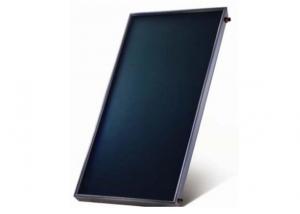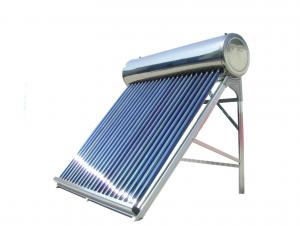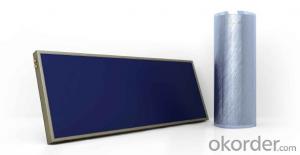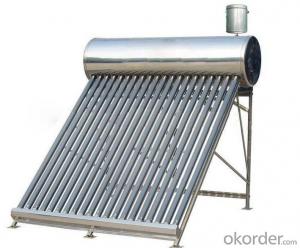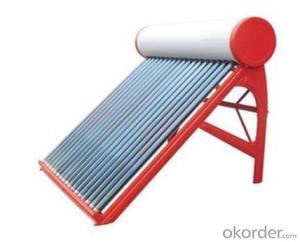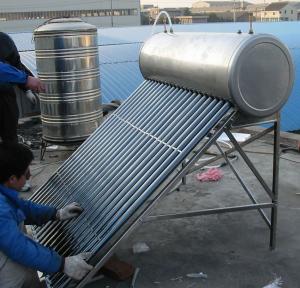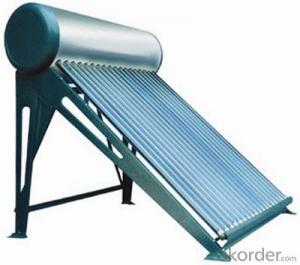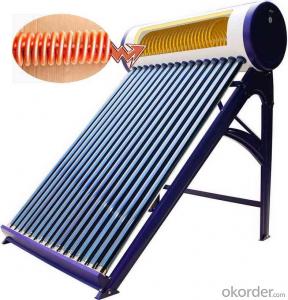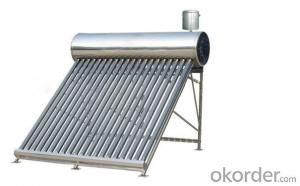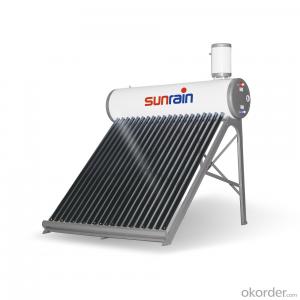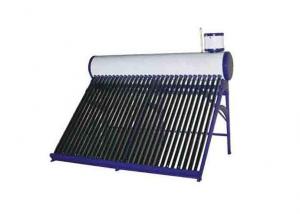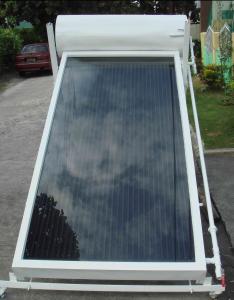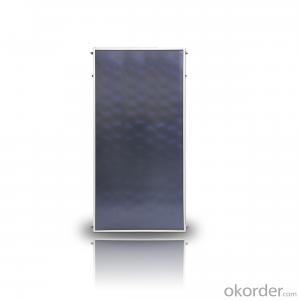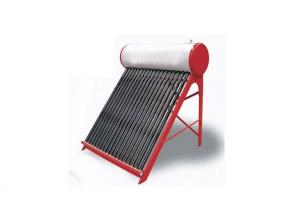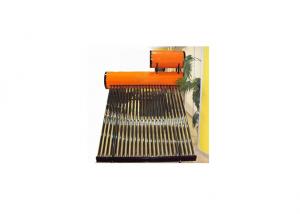Heat Exchanger Solar Water Heater (HYV8) - New Stainless Steel Non-Pressurized Model
- Loading Port:
- China Main Port
- Payment Terms:
- TT or LC
- Min Order Qty:
- 20 Set set
- Supply Capability:
- 2000 Sets per Month set/month
OKorder Service Pledge
OKorder Financial Service
You Might Also Like
Detailed Product Description
*Latest style & Hot sale style
*material of inner & outer tank: stainless steel SUS-2B 304
*automatically water supply
*Non-pressurized Solar Energy Water Heater
(It is specially designed for the acid rain area, since it is stainless steel outer tank material .
*SUS304-2B stainless steel inner tank material(310mm/360mm diameter, thickness:0.4mm )
*SUS304-2B stainless steel outer tank matetial(420mm/460mm diameter thickness:0.4mm)
*50mm/55mm thickness insulation with polyuthane foaming
*Capacity: 100L 150L 200L 300L etc
*assistant tank:5L
*SUS304-2B stainless support stand
*support angle: 27 / 45/ etc
*Vacuum tube style: Three-target & sealed glass style
*Vacuum tube size: 47*1500mm, 58*1800mm
*specific absorption: as=090-0.94
*average heat loss coefficient : Ult 0.6W
*Resistence to rain hail & acid rail
*easy installation
*lifespan: 15 years
*10 years warranty
- Q: Long term use of solar water heaters should not be how to maintain?
- Unplugged, on the roof, the winter without flowers, the water emptying, prevent freezing water, then put a summer on the line, the water will slowly evaporate, I do this is not a problem, the sensor in the water tank, and the electric heater life is generally 1 to 2 years that belongs to consumables, what was bad, what time to find someone to repair it, the glass tube is generally not bad
- Q: What is the difference between a passive and an active solar water heater?
- A passive solar water heater relies on natural circulation and gravity to move water through the system, whereas an active solar water heater uses pumps or other mechanical means to circulate the water.
- Q: How does the insulation of the water tank affect the performance of a solar water heater?
- The insulation of the water tank significantly affects the performance of a solar water heater. Adequate insulation helps to minimize heat loss, allowing the water to retain its temperature for longer periods. This ensures that the solar energy collected is efficiently utilized, resulting in higher water temperatures and improved overall performance of the system. Conversely, poor insulation can lead to significant heat loss, reducing the effectiveness and efficiency of the solar water heater.
- Q: Can a solar water heater be used in areas with limited access to building materials?
- Yes, a solar water heater can be used in areas with limited access to building materials. Solar water heaters are designed to be simple and efficient systems that can be constructed using locally available materials. They can be built using basic materials like metal or plastic pipes, glass or plastic sheets, and insulation. With proper design and installation, solar water heaters can effectively harness the sun's energy to heat water, providing a sustainable and cost-effective solution even in areas with limited access to building materials.
- Q: Are there any government incentives or rebates for installing a solar water heater?
- Yes, there are several government incentives and rebates available for installing a solar water heater. These incentives vary by country and region, but they often include tax credits, grants, or low-interest loans to help offset the cost of installation. Additionally, some utility companies offer rebates or bill credits for using solar energy. It is advised to check with local government agencies or energy departments to learn about specific programs and eligibility criteria in your area.
- Q: Can a solar water heater be used in areas with high levels of water chlorination?
- Yes, a solar water heater can be used in areas with high levels of water chlorination. The chlorination of water does not affect the functioning of a solar water heater. However, it is important to note that the chlorinated water may cause corrosion in the system's components over time, so regular maintenance and monitoring of the system will be necessary to ensure its longevity.
- Q: Can a solar water heater be used to heat swimming pools or hot tubs?
- Yes, a solar water heater can be used to effectively heat swimming pools or hot tubs. The solar collector panels absorb sunlight and transfer the heat to the water, which is then circulated through the pool or hot tub. This eco-friendly and cost-effective method of heating can help maintain comfortable water temperatures while reducing energy consumption.
- Q: Are there any government incentives or tax credits available for solar water heaters?
- Yes, there are government incentives and tax credits available for solar water heaters. In many countries, including the United States, there are federal, state, and local programs that offer financial incentives to promote the installation of solar water heaters. These incentives can include tax credits, rebates, and grants, which help offset the initial cost of purchasing and installing a solar water heater. It is advisable to check with local government agencies or consult a professional to determine the specific incentives and tax credits available in your area.
- Q: What is the expected energy production of a solar water heater?
- The expected energy production of a solar water heater depends on various factors such as the size of the system, location, climate, and usage patterns. On average, a well-designed and properly installed solar water heater can provide around 50-80% of a household's hot water needs, resulting in significant energy savings. However, it is important to consider these estimates as general guidelines, as individual results may vary.
- Q: Can a solar water heater be used in areas with high levels of pollution?
- Yes, a solar water heater can still be used in areas with high levels of pollution. While pollution can reduce the efficiency of solar panels to some extent, solar water heaters can still generate heat using sunlight even in polluted areas. However, it is important to regularly clean and maintain the solar panels to ensure optimal performance and efficiency.
1. Manufacturer Overview
| Location | Zhejiang,China (Mainland) |
| Year Established | 2004 |
| Annual Output Value | US$10 Million - US$50 Million |
| Main Markets | North America; South America; Southeast Asia; Africa; Oceania; Mid East; Western Europe |
| Company Certifications | ISO 9001:2000 |
2. Manufacturer Certificates
| a) Certification Name | |
| Range | |
| Reference | |
| Validity Period |
3. Manufacturer Capability
| a) Trade Capacity | |
| Nearest Port | |
| Export Percentage | 61% - 70% |
| No.of Employees in Trade Department | |
| Language Spoken: | |
| b) Factory Information | |
| Factory Size: | 5,000-10,000 square meters |
| No. of Production Lines | 8 |
| Contract Manufacturing | OEM Service Offered |
| Product Price Range | |
Send your message to us
Heat Exchanger Solar Water Heater (HYV8) - New Stainless Steel Non-Pressurized Model
- Loading Port:
- China Main Port
- Payment Terms:
- TT or LC
- Min Order Qty:
- 20 Set set
- Supply Capability:
- 2000 Sets per Month set/month
OKorder Service Pledge
OKorder Financial Service
Similar products
Hot products
Hot Searches
Related keywords






